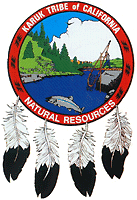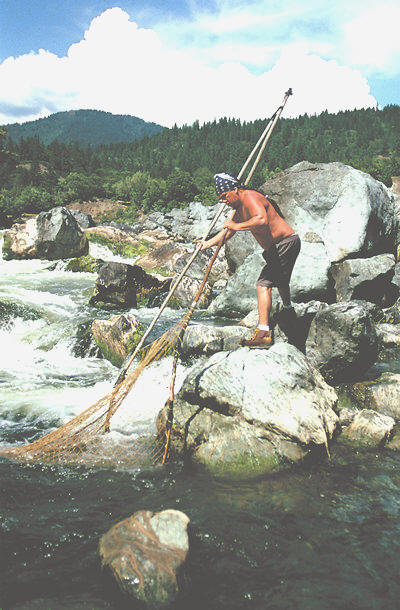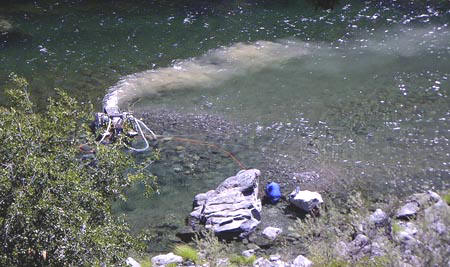CSPA |
| Your 501(c)(3) tax deductible cash donations are desperately needed if the fight for our fisheries is to continue. Read how you can donate! |
For Email Marketing you can trust |

 More News
More News
![]()
 Recreational Miners attack traditional Indian salmon fishing: Miners file vengeful petition asking state officials to shut down Karuk Tribe’s last dip net site
Recreational Miners attack traditional Indian salmon fishing: Miners file vengeful petition asking state officials to shut down Karuk Tribe’s last dip net site
March 3, 2009 -- Happy Camp, CA – Since the arrival of miners in the mid 1800’s the Karuk Tribe has lost nearly everything. Once the lone occupants of over 1.4 million acres of the Middle Klamath Basin, the Karuk had over 100 villages and associated fishing sites. A peaceful society blessed with an abundance of acorns, fish, and game, early observers described the Karuk as the wealthiest people in North America. Today, nearly 90% of Karuks living in ancestral territory live below the poverty level and Tribal members have access to only one fishery. Yesterday, a recreational gold mining club called The New 49ers challenged the Tribe’s right to fish there.
 |
Ron Reed with a traditional dip net at |
In a press release, the miners charge that the Karuk Tribe is guilty of “widespread and wanton” killing of salmon.
“These accusations are ridiculous,” responded Leaf Hillman, Vice-chair of the Karuk Tribe. “Our fishery is gear limited. This means that because we use traditional dip nets, we can only catch a very small percentage of fish that are coming up the falls. This is by design. The creator taught us to use dip nets in order to not over harvest fish. We would not have survived here for thousands of years had we abused this privilege granted to us by the Creator.”
Although many Tribes in the Pacific Northwest use gill nets that are strung across the river, the Karuk do not. Karuk fishermen stand on rocks and dip large nets on poles into the river to catch fish. Hillman noted, “Our fishery is non-lethal. This allows us to selectively harvest fish. In other words, we release ESA listed Coho and smaller chinook back into the river unharmed and we eat the rest. It also provides opportunities to tag fish for purposes of conducting scientific studies.”
The New 49ers’ petition to Fish and Game comes in retribution to the Tribe’s recent effort to restrict suction dredge mining in areas that serve as critical habitat for ESA listed coho and other fish listed as ‘species of special concern’ under the California ESA. This includes Pacific lamprey and green sturgeon.
 |
A suction dredge at work on the Klamath |
Suction dredging is a recreational activity that has been popularized in recent years by hobby groups and clubs such as The New 49ers.
In 2005 the Karuk Tribe sued Fish and Game for allowing the practice of suction dredge mining to occur in areas known to be critical habitat for endangered and at-risk species. At the time, Fish and Game officials submitted declarations to the Court admitting that suction dredge mining under its current regulations violates CEQA and Fish and Game Code §§5653 and 5653.9 (the statues which authorize the Department to issue permits for suction dredging under certain conditions) because the activity causes deleterious harm to fish – including endangered fish, such as the Coho salmon.
The suit ended in a court order directing Fish and Game to conduct a CEQA review and amend its regulations by June 20, 2008. Fish and Game has yet to initiate the process to change rules. Earlier this year the Tribe sued Fish and Game again in an effort to force immediate protections for fish.
The miners’ suit over the Karuk fishery is retaliation for the Karuks’ efforts. "Rather than address the issue head on, the miner's attorney has resorted to threats and intimidation," said Zeke Grader, of the Pacific Coast Federation of Fishermen's Associations. "People would not tolerate someone ripping up their yards or their crops in the field, but that's exactly what the miners are doing to the salmon the tribes and fishermen depend on. It's got to stop."
“We just want to do what we where doing when the first wave of miners showed up in 1850 – fish and feed our families. Over the last 150 years miners have taken nearly everything from the Karuk People. We will not allow them to take our last fishery,” concluded Hillman.
To date, Fish and Game has made no public comment regarding the miners’ petition.
# # #
Recent press releases and documents related to this issue can be found at: http://www.karuk.us/press/mining.php
S. Craig Tucker, Ph.D.
Klamath Campaign Coordinator
Karuk Tribe of California
NEW NUMBER home office: 707-839-1982
Tribal office in Orleans: 530-627-3446 x3027
cell: 916-207-8294
ctucker@karuk.us